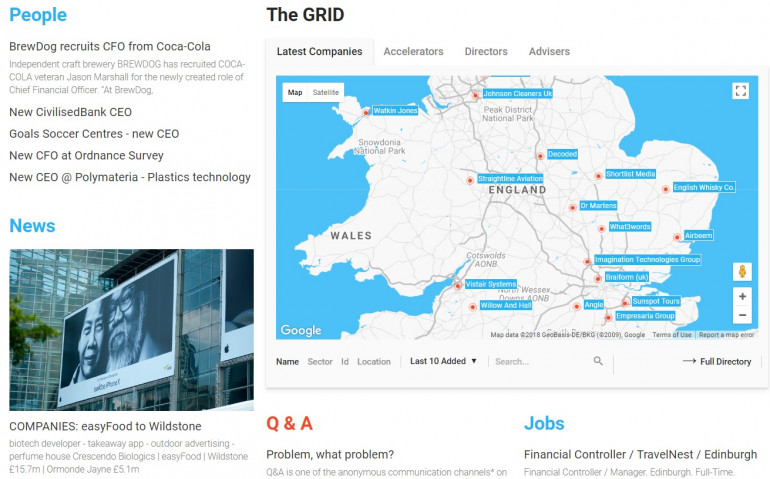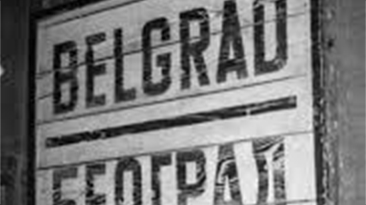Published by Directorzone Markets Ltd on April 11, 2016, 9:00 am in News, Other

News about 5 UK growth companies and/or accelerators (turnover in brackets) in the GRID marketplace, 3rd – 9th April 2016:
Raging Bull £5m | 77 Diamonds £16.4m | Mercia Technologies £1m | Moss Bros £121.1m | Candy & Candy £6.6m
Off-GRID*: Stannah: £220m
RAGING BULL: England’s Raging Bull touches down with dads and their lads | Oliver Shah, The Sunday Times. April 3
DZ profile:
Business: clothing brand
ICB Classification: 3763 Clothing & Accessories
Launched: 2003
Founder: Phil Vickery, 40, ex-International Rugby player, part of England 2003 World Cup-winning team. Still actively involved in Raging Bull and has kept a minority stake
Staff: managing director, Shannon Mercer
Financials: turns over £5m a year. Raging Bull hopes to increase sales to £30m within five years.
Investment: Last month brought in two former House of Fraser bosses as majority investors in Raging Bull. John King, 53, and Stefan Cassar, former chief executive and finance director of the store chain, replaced a disparate set of high-net-worth backers. Vickery and Mercer met their new majority shareholders in 2007, shortly after House of Fraser was taken over. Raging Bull went on to be sold in 40 branches of the department store and more than 100 independent shops.
News: hope to take Raging Bull overseas, capitalising on the growing popularity of rugby in America and Japan.
77 DIAMONDS: Footballers, supermodels and MPs love our bargain gems | Laura Onita, The Sunday Times
DZ profile:
Business: online jeweller. Makes bespoke diamond jewellery for Premier League footballers, MPs and supermodels and has a collection of 400,000 loose gems. In 2013, brought manufacturing in-house to control the stones’ quality. Claims the craftsmen in 77 Diamonds’ workshop made jewellery for the likes of De Beers, Cartier and the Queen. Customers pay an average £3,000 for engagement rings, necklaces and earrings. Although sells in 72 countries, Britain accounts for 80% of revenues. 77 Diamonds sources its gems from mines in Canada, Russia, Australia and Africa.
ICB Classification: 5371 Apparel Retailers
Launched: 2005
Location: Hanover Square, London, W1
Founders: Tobias Kormind, 43, with his friend Vadim Weinig (whose father and grandfather were Belgian diamond dealers)
Staff: 40
Financials: reported online sales of £16.4m and pre-tax profits of £260,000 in 2014. The company is free of debt.
Investment: The duo have fended off approaches from private equity investors, but they may soon go on a fundraising spree. Kormind, with his wife Ira and Weinig, is full owner.
News:
1. 77 Diamonds got off to a slow start. In its first two years it turned over “a couple of hundred thousand pounds” but sales rocketed to £2.4m after the founders redesigned the website in 2008.
2. There are plans to boost sales overseas, turning 77 Diamonds into a global player.
* STANNAH: Moving up in the world | Ready business Britain. April 3.
DZ profile:
Business: sells stairlifts. Originally made cranes and hoists for lifting cargo on to ships. Family business
ICB Classification: 2757 Industrial Machinery
Launched: 1867
Location: Was based at Bankside in central London until the area was decimated by German bombers in 1940. The headquarters were subsequently rebuilt in the borough of Southwark, where they remained until the company moved out of the city in 1974 to Andover, Hampshire.
Founder: great-great grandfather Joseph Stannah
Staff: 1,400 people in the UK and 350 overseas. Jon Stannah, managing director. “At the moment we’ve got four family members and five non-family members on the main board.”
Financials: £220m business
News:
1. The business has diversified and 40 years ago it started making the stairlifts with which the company name is now synonymous. That’s had a profound effect on the bottom line. “When I started in the business, our turnover was probably less than £40m,” Stannah says.
2. The growth is in no small part down to stellar sales overseas. “We grew our export business around the same time we started to manufacture and sell stairlifts and gained a network of distributors and subsidiaries, particularly in Europe, but also in America which has provided the basis for our growth,” he adds.
3. It was recently announced that Stannah will retain the 10-year contract for the maintenance and refurbishment of around 1,100 lifts on Network Rail stations in the UK.
MERCIA TECHNOLOGIES: swims against tide with northern investment push | Andrew Bounds, FT. April 4, 2016
DZ profile: Mercia Technologies Plc
Business: runs third-party investment funds using tax-friendly structures such as the Enterprise Investment schemes. It has a portfolio of university spinouts and other start-ups. ...original portfolio includes 22 investments that are mostly in the Midlands, where the company is based, Wales and the south-east. This “complete capital solution” helps take businesses through the difficult period between seed investors and support from big institutions. Mercia says its £30m cash pile allows it to support businesses for a decade or more, unlike the five-year timeframe of many private investors. Focuses on four areas: digital, life sciences, electronics and hardware, and software. It has partnerships with 14 universities, none exclusive.
Location: near Birmingham
Staff: Mark Payton, chief executive. Jonathan Diggines, chief executive of EV, has joined the board of Mercia and his team has stayed on since the deal.
Financials: For the half year to the end of September, it reported a pre-tax loss of £748,000 on revenue of £654,000. But the fair value of its investment portfolio increased by £4.6m to £29.2m over the same period.
Investment: It joined Aim in December 2014. Fund managers including Neil Woodford, INVESCO, and Baillie Gifford and NFU Mutual back it
News:
1. In March, the group acquired ENTERPRISE VENTURES, a northern venture capital fund with stakes in 150 companies and £200m of assets under management. The deal more than tripled Mercia’s pipeline of potential investments. EV was owned by its executives and has a 13-year history as a fund manager, often working with public-sector money to make early-stage investments. Mercia paid £9m, possibly rising to £11m, most in cash but about £700,000 in shares.
2. The deal came too late for Mercia to benefit from one of EV’s biggest initial public offerings. One of its funds owned 25 per cent of BLUE PRISM, which floated on March 18. EV had invested £900,000 and returned £2m to shareholders. However, it still holds 15 per cent of Blue Prism, whose “robotic animation” software does administrative tasks such as form filling for blue-chip clients. The IPO raised £21.1m at 78p a share, giving it a market capitalisation of £48.5m. The shares have since risen by half.
3. Mr Payton admits much of the City is waiting to see if the model works. Shares in pure university spinout funds, such as Imperial Innovations and IP GROUP, trade on a multiple of their net asset value. Mr Payton argues Mercia has greater diversity and its filtering process makes it less risky. Still, Mercia runs the risk of being stuck with stranded assets, unless other investors are willing to participate in future fundraisings and buy IPO shares. So it needs other fund managers to change the habits of a lifetime and back non-London companies.
UPDATE:
Satellite groups no longer UK’s sleeping giants | Nic Fildes, FT. June 22, 2018
4. Leeds-based SATSENSE just raised £750,000 from NPIF-Mercia Equity Finance, part of the Northern Powerhouse Investment Fund, to develop its app that can detect subsidence down to the millimetre. Mercia Technologies ...hopes to spot companies that have missed out on the ample capital pouring into the London and Cambridge tech clusters. Although SatSense has already been backed by one of its funds it is exactly the sort of company Mercia is hoping to unearth and it says it could be the subject of a direct investment in the future. Mercia has not been a shining star on the market. However, its results for the six months to December showed the fair value of its portfolio rising 24 per cent to £65m, revenue rising 65 per cent to £5m and a post-tax profit of £1.4m.
Tech helps small players break into healthcare market | Aliya Ram, FT. March 8, 2019
5. Its fund management business was originally set up to manage a portfolio focused on providing seed capital for projects coming out of the University of Birmingham and the University of Warwick.
6. Peter Dines, chief operating officer and head of life sciences and biosciences at Mercia.
7. Mercia Technologies has invested in businesses including CONCEPTA and biotech company OXFORD GENETICS. Mercia’s shares have fallen 2.6 per cent to 38p over the past year. It had revenues of £5.3m in the six months to September 30, up 8.7 per cent on the previous year.
MOSS BROS: benefits from lounge suits and wedding hire | Paul McClean, FT. April 6
DZ profile:
Business: retailing and hiring formal wear for men. Moss Bros Group PLC. is engaged in. The Company operates through Moss Bros branded mainstream stores and also trades through Savoy Taylors Guild fascia. It has 105 Moss Bros and Savoy Taylors Guild branded stores and 25 Moss Bros outlet stores. It has 127 Moss Bros Hire outlets, which are contained within core Moss Bros Retail and Savoy Taylors Guild Stores.
ICB Classification: 5371 Apparel Retailers
Location: Barking
Staff: Brian Brick, chief executive
Financials: Overall revenue for the year to January 2016 was up 5.5 per cent to £121.1m, and online sales, which represent 10 per cent of overall revenue, jumped 36 per cent. Pre-tax profits rose 23 per cent to £5.8m and overall like-for-like sales grew 7.6 per cent.
Investment: FTSE All-Share listed, London Stock Exchange. Sector: Consumer Services / Industry: General Retailers.
News: this year shook up its management team with the appointment of a new finance director, has begun a store refit programme which it hopes will boost sales.
CANDY & CANDY: interior design business swings to loss | Judith Evans, FT. April 9.
DZ profile:
Business: luxury interior design and development business. It handles interiors for yachts as well as prime homes. Is one of a group of companies run by Nick Candy and his brother Christian, who together developed One Hyde Park, London’s most expensive housing block.
ICB Classification: 2357 Heavy Construction
Launched: 1999
Location: London
Founders: Nick Candy and his brother Christian
Staff: it further cut staff numbers to 49 after shrinking the team from 84 to 57 the previous year as the company became less profitable
Financials: It swung from a £497,000 pre-tax profit in 2014 to a £551,000 loss in 2015 on turnover of £6.6m, thanks to costs relating to “pursuit of commercial office developments that were not concluded”, according to accounts filed to Companies House. Costs, also of £551,000, included staff and professional fees related to the office developments, the accounts said.
News:
1. CPC Group, a Guernsey-based company run by Christian Candy that also issues property loans, in March last year sold two office buildings in the Fitzrovia area of London with planning permission for redevelopment after opting not to proceed with the work.
2. Candy & Candy, meanwhile, faces a downturn in its core market of luxury residential property in London. The estate agency JLL this month reported a 30 per cent drop in new units seeking planning permission in central London after prices in the most expensive areas began to fall.
3. Candy & Candy said that it had “secured a number of exciting planning commissions in London which have strong potential for redevelopment”.
4. The company more than doubled its pay to directors during the year, with an outlay of £1.3m — compared with £625,000 a year earlier — bringing its total wage bill to £4.4m.








